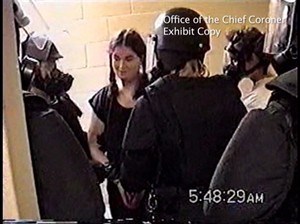
Ashley Smith is shown surrounded by guards at Joliette Institution in Joliette, Que., on July 26, 2007 in this image made from video. More than five years after a deeply disturbed teenager suffocated in her segregation cell, an inquest into her death that has already produced shocking surveillance videos is at last set to begin hearing evidence just weeks into the new year. THE CANADIAN PRESS/HO - Office of the Chief Coroner for Ontario
December 27, 2012 - 3:00 AM
TORONTO - More than five years after a deeply disturbed teenager suffocated in her segregation cell, an inquest into her death that has already produced shocking surveillance videos is at last set to begin hearing evidence just weeks into the new year.
It's been a long time coming for Coralee Smith, the mother Ashley Smith.
"Coralee Smith was told that when her daughter went into the federal system, she would find supports and help that wasn't available anywhere else," said lawyer Julian Falconer.
"The family feels utterly betrayed by Correctional Services."
Prisoner advocates and guards will also be looking for details about Smith's in-custody treatment as well as for recommendations on dealing with the mentally ill who run afoul of the law.
"Not just the public, but Ashley herself, felt that Corrections were entitled to do much of what they were doing to her because she was in jail," said Kim Pate, executive-director of the Canadian Association of Elizabeth Fry Societies.
"Once we start to believe that certain people don't deserve to be treated as though they're even human and without recognition that they will one day be back in our communities, we risk much not just for those individuals but for entire communities."
The video of how correctional authorities treated Smith caused public anger when it was screened amid legal wrangling in the fall.
Among other things, it showed authorities drugging the docile teen against her will, repeatedly threatening her with more "chemical restraints," and, at one point, duct-taping her wrists to a seat and threatening to duct-tape her face.
Several observers said many of the issues that led up to Smith's death persist within a prison system that is ill equipped to deal with the mentally ill.
Presiding coroner, Dr. John Carlisle, has made it clear that's one area he wants explored at the inquest into Smith's death.
First arrested at 13 for assault and causing a disturbance, the girl from of Moncton, N.B., found herself in trouble repeatedly. But her downward spiral appears to have begun in earnest when she was jailed at age 15 for throwing crab apples at a postal worker, apparently because she believed he was too slow to deliver social security cheques.
"Many, many Canadians thought that could be me, or that could be my child or my grandchild or my sister," Pate said.
Smith's sentence ballooned from days to years as time was added for numerous in-custody incidents — including attacks on guards or other inmates.
Kept almost entirely in segregation, the increasingly troubled teen spent the last year of her life shunted 17 times among nine institutions in five provinces. She tried to hurt herself with alarming frequency.
Finally, in October 2007, Smith, 19, choked to death at the Grand Valley Institution in Kitchener, Ont., as guards, under orders not to intervene, stood by.
Howard Rubel, the lawyer who speaks for the prison guards union, said his client is hoping the five-person jury will recommend an intelligent set of new rules for dealing with the mentally ill in prisons.
"There are some people who just don't fit properly within the penitentiary system," Rubel said.
"But you can't just say because they don't fit, we're just going to find a way to force them in or, even worse, put them in a cell in solitary for most of the time and relegate their appropriate care to people who are not trained in, and not used to dealing with, people with those difficulties."
In Smith's case, guards frequently found themselves in conflict with their bosses for treating Smith too kindly — a violation of a "withdrawal of warmth" policy — or venturing into her cell to remove objects with which she could have hurt herself.
"If (Smith's family) is able to help the many mentally ill who are currently incarcerated and to reverse this pattern of betrayal and abuse, that will in and of itself be a major accomplishment," Falconer said.
This is the second inquest into Smith's death. The first collapsed last year amid months of legal fights when the coroner, Dr. Bonita Porter, abruptly resigned.
The current probe — slated to start hearing evidence Jan. 14 — ran headlong into many of the same difficulties, as the federal government and doctors who treated Smith fought tooth and nail to severely restrict the scope.
The legal logjam was smashed in October and resistance to a broadly focused inquest crumbled when the surveillance video was screened, prompting Prime Minister Stephen Harper to order Correctional Service Canada to co-operate with the inquest.
Correctional authorities have since complied with Carlisle's order to catalogue and produce all relevant surveillance video, and some of the doctors who had resisted having to testify are now seeking standing at the inquest, expected to last a minimum six months.
News from © The Canadian Press, 2012